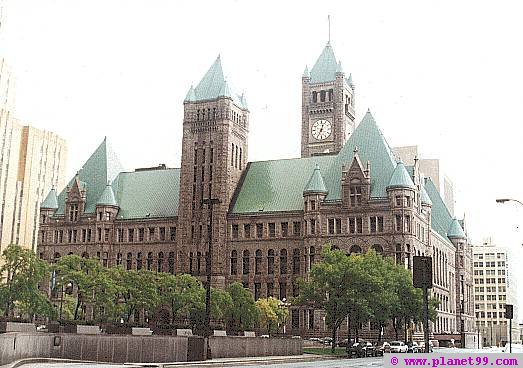MINNEAPOLIS (AP) -- Clem Haskins agreed Friday to a $1.5 million buyout of his contract with Minnesota, even though university investigators have found no evidence implicating the basketball coach in an academic fraud scandal.
 |
| Add caption |
University president Mark Yudof said it is ``extremely likely'' that fraud did occur and said a change was necessary to restore confidence in the university.
``It is clear that on his watch, substantial, numerous violations of our academic conduct code have occurred,'' Yudof said during a news conference. ``We thought it's time for a management change.''
Haskins will step down June 30, three years before his contract was to expire. He compiled a 240-165 record in 13 seasons, including a trip to the NCAA tournament Final Four in 1997.
Haskins has been under pressure since March, when former tutor Jan Gangelhoff said she did more than 400 pieces of course work for at least 20 basketball players from 1993 to 1998.
Since March, the investigation has widened to include accusations of improper payments, travel irregularities and improper relationships between the team and university police investigating possible crimes involving players.
Haskins asserted his innocence when the scandal broke on the eve of the Gophers' first-round NCAA game against Gonzaga. Four players were made ineligible for that game, which Minnesota lost.
He has maintained since then that he had no knowledge of wrongdoing. Phone calls to his suburban Minneapolis house Friday afternoon went unanswered.
Haskins issued a brief statement saying he had been honored to coach the Gophers and would continue to support them. The statement made no mention of the allegations or investigation.
Interim reports from investigators make it ``extremely likely there will be numerous findings of academic fraud, primarily and entirely connected to the writing of papers for students,'' Yudof said.
Though no evidence links Haskins to fraud, ``it is clear that public confidence in the academic integrity of the university has been eroded by the allegations. In order to restore that public confidence, a change in leadership is warranted,'' Yudof said.
The university is expected to report on its investigation to the NCAA in September. Yudof said earlier this week that the university was likely to sanction itself if its investigation showed ``slam dunk'' wrongdoing. Enforcement records show the NCAA generally is less harsh on universities that deal decisively with rule-breaking.
Yudof acknowledged that people, including Gangelhoff, say Haskins knew about academic cheating by players. But he said ``when it comes to direct, provable evidence today -- maybe not for all time, but for today -- that evidence does not exist.''
As a matter of decency and fairness, Yudof said, he felt the university should honor Haskins' contract. The buyout will be paid for with money from the men's athletics department, he said.
He said Haskins established an ``enviable record'' as coach.
``He has communicated to his players the goals of playing hard, working hard to achieve career goals, respecting others -- including opponents -- and becoming honorable men,'' Yudof said. ``The university is grateful for the 13 years of service coach Haskins has provided, and we wish him a future of success and good health.''
Haskins' fate apparently was decided this week after two critical meetings within 24 hours at his home. He met Tuesday for three hours with independent investigators Michael Glazier and Donald Lewis. On Wednesday, Haskins and his lawyer, Ron Zamansky, met with Yudof and university counsel Mark Rotenberg.
Reaction from Haskins' peers was sorrow.
``Today I feel that the Big Ten has lost a very good coach and a friend,'' Michigan State coach Tom Izzo said. ``I wish him nothing but the best in his future plans.''
Jim Dutcher, who resigned as Minnesota coach in 1986 after three of his players were arrested on suspicion of rape, said he knows how hard it is to leave a program.
``You never take joy in anyone else's misery and I know Clem is a very proud guy and I know he took pride in his program so I know this hurts him.''
Jim Lord, a lawyer for several people who have alleged wrongdoing in Minnesota athletics, called the buyout ``bad public policy'' without considering a challenge to Haskins' contract.
``He orchestrated the scandal and in return they stuffed his pocket so full of money he has to waddle out of Williams Arena,'' Lord said.
State Sen. John Marty also said he was disappointed at the buyout.
``If someone's innocent of wrongdoing don't get rid of them, period,'' Marty said. ``But if they did something wrong, paying a million and a half bucks to push him out of the way is really unfortunate. It sends a bad signal.''
Haskins had three years left on a 10-year contract he signed in 1994, retroactive to the 1992-93 season, that contained provisions that several legal experts have described as rare for college coaches.
The contract ensured Haskins about $423,000 even if the university could prove a just-cause firing, and the terms would have made that process difficult and slow. If Haskins were terminated without cause, the contract entitled him to about $1.3 million plus several hundred thousand dollars in benefits.
The information contained in the AP News report may not be published, broadcast or redistributed without the prior written authority of The Associated Press.
No comments:
Post a Comment